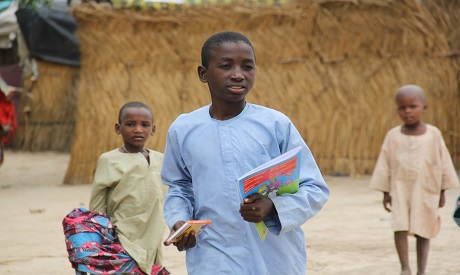
A group of children walk through huts at the El-Miskin Internal Displaced Camp on August 20, 2020 in Maiduguri. (Photo: AFP)
At least 463 million children around the world lack access to remote learning due to the coronavirus-related closure of schools, the United Nations Children's Fund (UNICEF) said on Thursday.
Noting in a tweet that around 1.5 billion schoolchildren were affected by school closures, the UN agency described the situation as a "global education emergency."
“The sheer number of children whose education was completely disrupted for months on end is a global education emergency. The repercussions could be felt in economies and societies for decades to come,” said Henrietta Fore, UNICEF’s executive director.
After analysing information from 100 countries, UNICEF concluded that some children may not be able to learn remotely because of "competing factors at home" even when they have access to the necessary platforms.
These factors include "pressure to do chores," "being forced to work," "a poor environment for learning," and "lack of support in using the online or broadcast curriculum."
This is the case for children from pre-primary to upper-secondary school levels, the UN body warned.
Schoolchildren in sub-Saharan Africa, UNICEF reported, are the worst affected, while those affiliated with the poorest households and rural areas in all parts of the world are "at high risk of missing out during closures."
Globally, 72 per cent of schoolchildren unable to access remote learning live in their countries’ poorest households.
In upper-middle-income countries, schoolchildren from the poorest households account for up to 86 percent of students unable to access remote learning, according to the report.
UNICEF called on governments to prioritise the safe reopening of schools when they begin easing lockdown restrictions, along with urgent investment to facilitate digital access for children.
“When reopening is not possible, [we] urge governments to incorporate compensatory learning for lost instructional time into school continuity and reopening plans,” said the agency, explaining that school opening policies and practices must include expanding access to education, including remote learning, especially for marginalised groups.
The body also stressed that education systems must be capable of adapting to new changes or crises.
Short link: